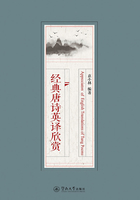
6.绝句
两个黄鹂鸣翠柳,一行白鹭上青天。
窗含西岭千秋雪,门泊东吴万里船。
中文解读
此诗为杜甫的绝句名篇。公元762年,安史之乱发生,杜甫一度避往梓州,第二年安史之乱得以平定,杜甫也回到成都草堂。这时他的心情很好,面对这一派生机勃勃,情不自禁,写下这一首即景小诗。这首诗描绘草堂周围明媚秀丽的春天景色,用“黄鹂”“翠柳”“白鹭”“青天”勾画出四个独立的景色,营造出一幅生机勃勃的图画,诗人望着来自东吴的船只,不觉勾起了乡愁,细致的内心活动自然地流露出来。
这首绝句虽一句一景,但又融而为一,其中起联结作用的正是诗人内心的心绪。在表面看来是一派生机,欢快明亮的景象中,寄托着诗人对时光流逝,孤独而无聊的失落之意,写出了诗人重有一线希望时复杂的心绪,在那希望之外,更多的是诗人对失望的感伤,对希望可否成真的无着、彷徨。以清新轻快之景寄托自己内心这般复杂的心情,正是此诗的主意之所在。
白话译文
两只黄鹂在翠绿的柳树间婉转地歌唱,一行整齐的白鹭直冲向蔚蓝的天空。
窗前可以望见西岭上堆积不化的积雪,门外停泊着自万里外来的东吴的船只。
英译一
Heptasyllabic Quatrain
Translated by Zhu Manhua
Two yellow orioles were singing in the green willow,
One line of white egrets were flying over the blue sky.
West-Ridge heavy snow was swallowed by my window,
East-Wu myriad ships sailed to pass my door nearby.
(oriole n.金莺 white egret 白鹭 ridge n.山脉 swallow v.吞下myriad adj.无数的)
英译二
Heptasyllabic Quatrain
Translated by Kiang Kang-hu
Two golden orioles sing amid the willows green,
A row of white egrets fly into the blue sky.
From my window the snow-crowned western hills are seen,
Beyond the door the east-bound ships at anchor lie.
(amid prep.在……其中 crown v.加冕,覆盖 at anchor停泊)
英译欣赏
The poet wrote this poem in his thatched cottage in Chengdu when he was in a happy mood after the suppression of An Lushan's rebellion in 762 AD. The four sentences in the poem portray four different sceneries—the singing orioles, the flying egrets, the accumulated snow and the mooring boats—all showing the beautiful environment he was living in.
这首《绝句》英译很多,英译一是首都经济贸易大学朱曼华教授的译作。
英译二是著名翻译家江亢虎的译作,他于1929年和Witter Bynner合作翻译出版The Jade Mountain(《群玉山头》),是美国影响最早、最大的唐诗英译本。两译文都采用直译,英语经典地道,清楚易懂,均采用abab韵尾。
“两个黄鹂鸣翠柳”, oriole 是金莺。“黄鹂”,英译一译为yellow oriole,英译二译为golden oriole。“翠柳”,英译一译为green willow,但英译二为了押韵,将green willows 写成willows green。
“一行白鹭上青天”,两译文大同小异。英译一用过去进行时态One line of white egrets were flying over the blue sky;英译二用一般现在时A row of white egrets fly into the blue sky。
“窗含西岭千秋雪”,英译一译为被动句型:West-Ridge heavy snow was swallowed by my window,西岭千秋雪被我的窗子吞下,形象生动!英译二也用被动句,但是倒装了,应为The snow-crowned western hills are seen from my window,被雪覆盖的西岭从我的窗子里可以看见,稍显直白。
“门泊东吴万里船”,英译一译为East-Wu myriad ships sailed to pass my door nearby,东吴无数的船从我家门前附近经过。“泊”译成了sail to pass (经过),似乎不符合原诗。英译二译为Beyond the door the east-bound ships at anchor lie,此句是倒装句,应为The east-bound ships lie at anchor beyond the door。向东开去的船停泊在门的外面。这里beyond 用得很好,意指“在……之外,在更远处”,因为江河上的船看似在门外,实则在离门很远的地方。
“千秋”“万里”都采用虚化处理,没有直译。“船”,两个译者都译为ship,似不太妥当,因为ship 指大型轮船,在中国古代,江上往来的应是boat(小船,舟)或barge(驳船)。虽有瑕疵,但这两个译文都是上乘之作。
思考
“一行白鹭”,翻译成a line of white egrets 还是a row of white egret更好?